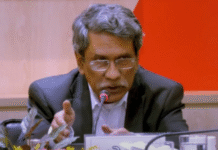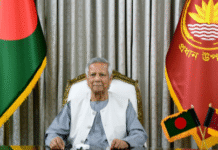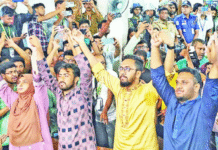Many traffickers are operating in Teknaf by managing the police and the administration, they claimed to the Dhaka Tribune.
Interestingly, it is also found that three of the rescued passengers are now ready to travel on a fishing boat which will leave for Malaysia shortly.
Imtiaz, coming from Moheshkhali, was rescued on June 12 along with 230 passengers. He has already reached “Kochubunia” sea point under Sabrang union in the Bay of Bengal which is popularly known as an airport to Malaysia.
Broker Jashim rescued him from Teknaf Degree College the same day in exchange of Tk2,000. The money was received by Sub-Inspector Gobinda of Teknaf police station, said Jashim who comes from Sonarpara area of Ukhiya.
When this correspondent informed the police immediately about the move, the law enforcers said they had no such information.
Like Jashim, many traffickers coming from different districts are now staying in Teknaf area to send the recently rescued passengers again to Malaysia.
Alim Laskar, a broker from Jhenaidah, is now staying in Teknaf to convince his previous passengers again to travel to Malaysia.
This correspondent met these brokers identifying as a trafficker from Dhaka having five people on hand who were willing to go to Malaysia.
Alim said: “My passengers whom I managed from my district are eager to go to Malaysia by using this sea point of Bay of Bengal. For this purpose, I arrived here a day ago. I have already managed my three passengers by giving the police money and now they are under my control.”
He said the passengers too wanted to go to Malaysia this way.
“Except for one passenger named Mithun Sheikh from my district, I have managed three others to send to Malaysia again. To manage the three, I had to pay the Teknaf police Tk6,000,” he claimed.
When asked accepting the money, SI Gobinda declined to talk about it. He, however, told the Dhaka Tribune that the police members had arranged the money personally so that the rescued passengers could reach their families.
It is learnt from Alim that his brother Mukul Laskar is living in Malaysia. For every passenger, Alim charges Tk2-3 lakh to send them to Malaysia.
He does not take money from the passengers until they reach Thailand’s border. Even the fare of fishing trawler has to be paid by the traffickers – Tk2,000 for each passenger. After reaching there, the passenger’s family has to pay him the full amount. Later he informs the Thailand-based traffickers to send those passengers to the Malaysian border at which point his brother manages the Malaysian authorities to receive those infiltrators, says Alim.
Jashim told the Dhaka Tribune that there had been many traffickers active throughout the country who they never met before. They contact each other via mobile phones.
The migrant workers who reach Malaysia in the illegal way inform their families to manage some new people from villages and provide them the mobile number of Teknaf-based main broker.
When the new people contact with the brokers, they tell them to come to Teknaf with Tk10,000. If the people are poor, the brokers offer to send them to Malaysia without any money. But when those passengers reach the Thailand border, the traffickers and the crew of the trawlers torture them brutally and force them to ask their families to pay the money to the Teknaf-based broker.
If they fail to do so, the passengers are sometimes killed, Jashim said.
Traffickers operate freely
When confirmed by an influential ruling party leader, who wished to be anonymous, said some passengers were ready to travel to Malaysia from Kocubunia point of Sabrang union, this correspondent rushed to the spot – some 17 kilometres from Teknaf Sadar area – on June 13 and found nine passengers waiting in a shanty for boarding on a fishing trawler.
Those people confirmed that they were going to Malaysia using the illegal way. Each of them had water bottles filled with two gallons of water and a small backpack with them.
Among them was Abu Bakar who came from Netrokona. He said: “The broker told me that if we go to Malaysia we can earn Tk70,000-80,000 per month. There is no way to earn this amount here in Bangladesh.”
A mark on his right hand means that he is the passenger of a certain broker. All the nine people had similar seal on their hands.
“Now we have nothing to do as we have already spent some cash to come here and we are from very poor families. So we have to start now [for Malaysia],” Bakar said.
Many of them agreed that it was an illegal way, but suggested that the legal way would cost them more.
“Many young people of my village who went to Malaysia this way are now earning lucrative amounts of money there,” he said.
When asked about these new passengers, Teknaf police station Second Officer Kamrul Azam said: “We have no such information. We will investigate this and if found, we will arrest all of the traffickers active there.”
Teknaf Coast Guard Station Commander Quazi Harunur Rashid said: “There are some remote points used for human trafficking where the force members cannot reach without information. Even the BGB and the police have no check posts there.
“The traffickers are very cautious when sending passengers to Malaysia. They keep their men at every entry point of those remote areas. If they can sense our presence, they will just disappear.”
Many teenagers even those of class IX or X are leaving school to go to Malaysia on fishing trawlers, said Mohammed Ismail Hossain, headmaster of Malka Banu High School in Teknaf.
Australia lucrative destination
Many local people said now the brokers were sending many people to Australia using the waterways.
About one month ago, 40 people in a group went to Australia from Shyamlapur point of Teknaf. Those people were from Teknaf and Ukhiya.
Rehana Begum, wife of one of them Ajgar Ali, said: “My husband went to Australia one month ago by using the borders of Thailand, Indonesia, Sri Lanka and East Timor. For this, we paid the brokers Tk6 lakh in several phases.
She said the local traffickers had strong connection with brokers in other countries that help the passengers reach their destination.
Source: Dhaka Tribune









